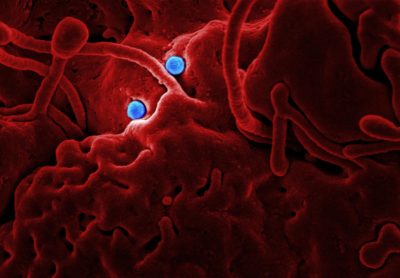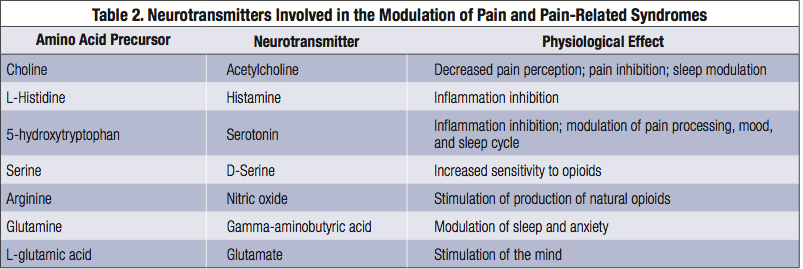
“Treatment without prevention is simply unsustainable.” – Bill Gates
Nutrition and Diet:
Amino Acids
Food, food supplements and “medical foods” provide important options to help prevent and control pain and should be considered as a part of everyone’s approach to pain management. Because chronic pain impacts so many other conditions including mood, sleep and overall health, the role of nutrition in chronic pain is vast and impossible to review under a single heading. Please review this page as well as the links below to learn more about the roles of amino acid supplements in the management of chronic pain and sleep. This represents an initial introduction only, more information is forthcoming.
See also:
- Diet & Pain – An Overview
- Diet & Diets
- Nutrition: Carbohydrates
- Supplements
- Integrative, Complementary and Alternative Medicine
Purchasing Supplements
When purchasing supplements reviewed on this web site and discussed with Dr. Ehlenberger, a discount on usual commercial pricing can be obtained by purchasing from Accurate Clinic’s online Supplement Store after acquiring the discount code from Accurate Clinic:
Accurate Clinic’s Supplement Store
or call Toll-Free: 877-846-7122 (Option 1)
Key to Links:
- Grey text – handout
- Red text – another page on this website
- Blue text – Journal publication
.
Nutrition & Pain
Amino Acids and Neurotransmitters
Amino acids are made of nitrogen molecules attached to hydrogen. The body utilizes about 20 different amino acids of which nine are classified as “essential” since they cannot be manufactured by the body but they can be metabolized into all of the others (with the possible exception of carnitine). Dietary protein is simply a matrix of amino acids and protein derived from animals (meat), milk, eggs, fish, plants, or nuts.
Amino acids are required for the production and maintenance of almost every function and tissue in the body. Their critical roles as thebuilding blocks of muscle, bone, and hormones are well known. Less well known, but more crucial in terms of pain management, is the fact that endorphin, serotonin, and GABA—our primary pain modulating neurotransmitters—are produced almost exclusively by specific amino acids.
The rationale for using amino acids in the treatment of chronic pain syndromes is based on the belief that in chronic pain, metabolism is disrupted, leading to a depletion of neurotransmitters associated with an increase in precursor turnover and the potential for a dietary deficiency of the precursors. Many neurotransmitters are involved in pain, as well as in conditions such as sleep dysfunction, mood disorders, and fatigue. Abnormalities in neurotransmitter levels also have been documented in fibromyalgia.
In some cases, amino acids are precursors to the body’s manufacturing of neurotransmitters important in pain processing (see table below). In other cases, they may affect pain in other ways. The amino acid D-phenylalanine inhibits the enzyme endorphinase that breaks down endorphins, the natural opioid neurotransmitters produced by the body to suppress pain, thus enhancing endorphins pain benefits.
Protein Requirements
Not only are amino acids used in the production of neurochemicals and hormones critical in the management of pain, they are essential for muscle, bone, and soft tissue building and maintenance. Muscle wasting is a common occurrence in chronic pain patients. Many pain patients tend to eat foods that are high in sugars and starches (carbohydrates) or fats and not enough protein to raise and maintain levels of endorphin, serotonin, and GABA.
Because amino acids are not stored by the body, chronic pain patients must eat protein on a daily basis. By conservative estimate, postoperative and chronic pain patients can only prevent significant muscle-wasting and neurotransmitter level depletion by consuming 90-100 grams of protein per day. This might look like: Breakfast–eggs and ham; lunch–a large turkey or beef sandwich; dinner–a salmon steak. Protein powders supplements can also be used.
Amino Acid Supplements as Precursor Therapy
Amino acid supplements are available for use in physiologic or even supra-physiologic doses. When singular amino acids are given, it is called “precursor therapy” because certain amino acids are the initial chemical building blocks in metabolic pathways. The goal of therapy is to provide a substrate that will raise the body’s levels of one or more of the targeted pain-killing neurochemicals. The best studied amino acids used as precursor therapy are tryptophan, glutamine and tyrosine.
Tryptophan
Tryptophan is perhaps the best-known amino acid precursor due to its wide scale use for weight control, depression, and insomnia. Tryptophan is the precursor for the body’s manufacturing of serotonin and melatonin. Serotonin is known to be related to pain modulation, so tryptophan and its metabolite 5-hydroxy tryptophan are increasingly used for pain control. Serotonin is also a critical component in mood, with serotonin deficiency a key player in depression and the target of most antidepressan medications which are designed to increase serotonin levels.
The end product of the tryptophan metabolic pathway is melatonin which is widely used for sleep, especially in time-zone adjustment and benzodiazepine withdrawal.
Dosing
The starting daily dosage of tryptophan is in the range of 1000 to 2000 mg a day.
Glutamine
Glutamine is the dietary amino acid that is the precursor of gamma amino butyric acid (GABA). GABA is a major inhibitory neurotransmitter
in the central and peripheral nervous systems that is critical for pain control and important in reducing anxiety. Many prescription medications mimic GABA activity by various mechanisms, including the benzodiazepines (Xaax, Valium etc.), gabapentin, and pregabalin.
Dosing
Glutamine and GABA are widely available in tablet or capsule form and GABA can be obtained as a sublingual preparation with starting oral dosages in the range of 1000 to 2000mg each day.
Tyrosine
Tyrosine and its precursor phenylalanine are incorporated into the catecholamine pathway, in which the end-products dopamine, norepinephrine, and epinephrine (adrenalin) are well known to be involved with energy, fatigue, thermogenesis, motivation, depression and addiction. They may also have a direct interaction with pain modulation.
Dosing
Tyrosine and its precursor phenylalanine are inexpensive and available as oral tablets and capsules with a starting daily dosage usually ranging from 1000 to 2000mg.
Cautions and Disclaimer
It is cautioned that precursor amino acids are not a substitute for standard medical therapy but an adjunct on a purely clinical trial basis. Dosages are not standard, and there are essentially no random, double-blind studies that meet the evidence-based criteria of a prescription-approved product. Amino acids can’t be patented and so, without economic motivation, there will likely be no future wide-scale controlled trials.
On a practical note, precursor amino acids must be taken with cold fluids on an empty stomach otherwise they may be digested as food. Most practitioners who recommend amino acids also suggest that vitamin B-6 supplements be taken con-currently since this vitamin is a critical co-factor in amino acid metabolism.
Therapeutic Benefits of Medical Foods with Amino Acids
Pain and Stiffness in Low Back Pain
The goal of using medical food amino acids is to restore the balance of these neurotransmitter levels. Studies indicate that supplementing with an amino acid formulation (Theramine) that contains the neurotransmitter precursors choline, L-histidine, 5-hydroxytryptophan, serine, and arginine for low back pain (LBP) can be safer and more effective for pain and stiffness than the use of NSAIDs. These amino acid supplements have also been shown to reduce inflammation based on laboratory assessment of inflammatory markers.
Sleep Disturbances
Neurotransmitters, including serotonin and acetylcholine, modulate the sleep cycle and their adequate supply is important for the maintenance of proper sleep, including phase IV delta and REM sleep. A well-designed study of 111 adults with a history of sleep disturbance (defined as “a perceived lack of restorative sleep”) evaluated the benefit of an amino acid formulation (Sentra PM) containing acetylcholine and serotonin precursors compared with trazadone, a commonly prescribed hypnotic sleep medication. The results indicated the amino acid formulation reduced sleep latency (time required to fall asleep) and improved sleep quality without morning grogginess more effectively than trazadone alone but also acted synergistically with trazodone to improve outcome best with both together.
In another 2009 study, 18 patients with sleep disorders, it was shown that an amino acid preparation containing both GABA and 5-hydroxytryptophan (Gabadone) reduced time to fall asleep, increased the duration of sleep, and improved quality of sleep.
Nutrition – Carbohydrates
See: Nutrition – Carbohydrates
References:
Nutritional Supplements – An Intro to Basics
Nutritional Supplements – Amino Acids
Amino Acids for Pain
Amino Acids for Pain – Theramine
- reduction-in-pain-and-inflammation-associated-with-chronic-low-back-pain-with-the-use-of-the-medical-food-theramine-2014
- a-double-blind-controlled-trial-of-a-single-dose-naproxen-and-an-amino-acid-medical-food-theramine-for-the-treatment-of-low-back-pain-2010
</s pan>
Amino Acids for Sleep
- medical-foods-hold-promise-in-chronic-pain-patients-2016
- sentra-pm-a-medical-food-and-trazodone-in-the-management-of-sleep-disorders-2012
- sleep-deprivation-and-pain-perception-2006
- a-randomized-placebo-controlled-trial-of-an-amino-acid-preparation-on-timing-and-quality-of-sleep-2009
Amino Acids for Sleep – Sentra
- medical-foods-hold-promise-in-chronic-pain-patients-2016
- sentra-pm-a-medical-food-and-trazodone-in-the-management-of-sleep-disorders-2012
Amino Acids for Sleep – Gabadone
Nutritional Supplements – L-Glutamine
Emphasis on Education
Accurate Clinic promotes patient education as the foundation of it’s medical care. In Dr. Ehlenberger’s integrative approach to patient care, including conventional and complementary and alternative medical (CAM) treatments, he may encourage or provide advice about the use of supplements. However, the specifics of choice of supplement, dosing and duration of treatment should be individualized through discussion with Dr. Ehlenberger. The following information and reference articles are presented to provide the reader with some of the latest research to facilitate evidence-based, informed decisions regarding the use of conventional as well as CAM treatments.
For medical-legal reasons, access to these links is limited to patients enrolled in an Accurate Clinic medical program.
Should you wish more information regarding any of the subjects listed – or not listed – here, please contact Dr. Ehlenberger. He has literally thousands of published articles to share on hundreds of topics associated with pain management, weight loss, nutrition, addiction recovery and emergency medicine. It would take years for you to read them, as it did him.
For more information, please contact Accurate Clinic.
Supplements recommended by Dr. Ehlenberger may be purchased commercially online or at Accurate Clinic.
Please read about our statement regarding the sale of products recommended by Dr. Ehlenberger.
Accurate Supplement Prices
.

